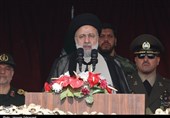Saudi Seeking to Hit Iran by Pursuing Closer Ties with Israel: Ex-US Diplomat
TEHRAN (Tasnim) ŌĆō An American author and former diplomat deplored the Israeli regime as ŌĆ£the Apartheid EntityŌĆØ and said Riyadh is seeking to change the government in Iran by pursuing closer ties with Tel Aviv.
“Saudi Middle East policies appear built on regime change in Iran and the Kingdom's overestimation of its self-importance,” Michael Springmann, the former head of the American visa bureau in Saudi Arabia, said in an interview with the Tasnim News Agency.
“In my view, Saudi Arabia has one and only one goal in pursuing closer ties with Israel, the Apartheid Entity: the destruction of Iran,” he said.
J. Michael Springmann served in the US government as a diplomat with the State Department's Foreign Service, with postings in Germany, India, and Saudi Arabia. He left federal service and currently practices law in the Washington, DC, area. Springmann’s works and interviews have been published in numerous foreign policy publications, including Covert Action Quarterly, Unclassified, Global Outlook, the Public Record, OpEdNews, Global Research and Foreign Policy Journal. He has written Visas for Al Qaeda: CIA Handouts That Rocked The World and a second book Goodbye, Europe? Hello, Chaos? Merkel’s Migrant Bomb. Both are available on Amazon. The books’ website is: www.michaelspringmann.com
The following is the full text of the interview:
Tasnim: As you know, the Israeli and Saudi regimes do not have any official diplomatic relations but media reports have surfaced indicating extensive behind-the-scenes diplomatic and intelligence cooperation between the two. In your opinion, what goals is Riyadh pursuing by getting closer to Tel Aviv?
Springmann: In my view, Saudi Arabia has one and only one goal in pursuing closer ties with Israel, the Apartheid Entity: the destruction of Iran. The Saudis have an inflated view of their own worth and their own power. Some of it is cultural and some of it is political. And they want to use this perceived dominance to topple the Islamic Republic.
As a whole, the Saudis and their government want to be the dominant force in the region. The largest country there, the birthplace of Islam, yet dominated by Wahhabi fanatics, the Kingdom apparently believes it has the right to dictate international policy. To do so, it needs allies.
Riyadh has America's backing, but even in the United States, long an enemy of Iran, Saudi excesses are beginning to alienate some influential politicians and parts of the news media. Therefore, the Kingdom is seeking extremist collaborators closer to hand. Israel, with its irrational hatred of Iran, fills the bill. Backing Riyadh with its hidden nuclear, biological, and chemical weapons, Israel can help wreck the Islamic Republic--so long as someone else fights and dies in the process.
Tasnim: Recently, some media reports revealed secret links between top Saudi officials, including Minister of State for Foreign Affairs Adel al-Jubeir, and the Israeli spy agency, Mossad. Can we say that Israel has managed to infiltrate into Saudi Arabia and is dictating its policies to Riyadh? How do you see the future of relations between the two?
Springmann: Asserting that the Israelis have infiltrated the Saudi government and are now dictating future policy in the Kingdom doesn't quite fit the facts. While the Saudi-sponsored Arab Peace Initiative - a peace plan dating back some 16 years - may have marked a change in the Saudi outlook towards Israel, nothing of substance occurred subsequently. The reason is simple: it offered a full peace to Israel in return for things the Zionists would never accept--return to pre-1967 ceasefire lines; a just resolution of the Palestinian refugee problem; and a Palestinian capital in East Jerusalem.
The real change occurred when the overly-ambitious Mohammed bin Salman began moving up in the Saudi government: head of the Crown Prince's Court, with the rank of minister (2013); Minister of Defense (2015); and Crown Prince (2017). Bin Salman's irrational hatred of Iran matched that of Apartheid Israel's Prime Minister, Binyamin Netanyahu. They both opposed the Joint Comprehensive Plan of Action. They hated Iran's assistance to Syria, enabling Al-Assad's legitimate government to survive their attacks. Together, they began fulminating against the Islamic Republic and apparently started planning ways to bring it down.
Without the aid of a crystal ball or a gypsy fortune teller, the future of Saudi-Israel relations is not entirely clear. Certainly, Netanyahu is the hardest of the hardline Israeli officials. And he may leave office should he be indicted for corruption. However, given the increasingly radicalized Israeli voter and the choice of extremists that could succeed Netanyahu, there will likely be no drastic shift in policy towards Iran.
The real question is how long Mohammed bin Salman will remain as Crown Price and work with the United States and the Kingdom against Iran. If he's removed for his extremist behavior in Yemen and against Qatar and Iran, the Saudis may become more moderate in their foreign policy. If he stays, we will see more of his militant behavior and increasingly closer ties to the Zionist Entity.
Tasnim: Generally speaking, how do you think about Saudi policies in the Middle East, including normalization of ties with Israel, and do you believe that regional countries would follow suit? If they would do so, how much are they ready to pay?
Springmann: Saudi Middle East policies appear built on regime change in Iran and the Kingdom's overestimation of its self-importance. By and large, given Crown Prince Mohammed bin Salman's ambitions and radical behavior, Riyadh seems bent on throwing its weight around. Without oil and the funds derived from it, the Saudis would be bereft of influence, unable to buy governments or weapons to use against them. Improved ties with Israel are part and parcel of this. The Kingdom (especially its crown prince) apparently sees the Zionist Entity as a helper in asserting their regional policy, especially in their efforts to impose their control on other countries in the neighborhood.
The other Arab states may not necessarily follow the Saudi line. They have their own internal difficulties, such as Algerian resistance to President Bouteflika’s attempt to extend his time in office. Also, the Kingdom is not well-liked by its neighbors, except for the autocratic members of the (Persian) Gulf Cooperation Council.
For the Saudis to bring along a significant portion of the Arab world, a lot of money and aid would be necessary. Getting other Arabs to die for Riyadh's foreign policy could well be another matter. Any kind of cooperation could prove difficult. As one Palestinian-American always says, 300 million Arabs cannot recognize their own interests. Moreover, they are either unable or unwilling to promote and protect them if they could realize what they were.






